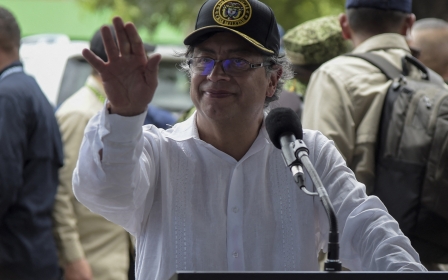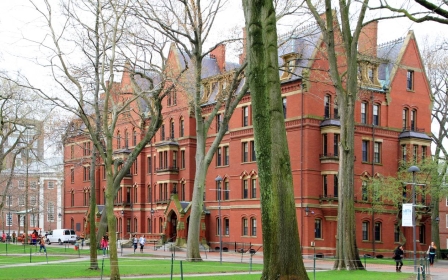Brazil elections: Bolsonaro could move embassy to Jerusalem if re-elected, say experts

Brazil's far-right President Jair Bolsonaro could follow through with plans to move the country's embassy in Israel to Jerusalem if he secures victory in Sunday's election, according to experts.
Following a closer than expected first round of voting, Bolsonaro and leftist former president Luiz Inacio Lula da Silva, popularly known as Lula, go into a second round of voting on Sunday in one of the most heated political showdowns in Brazil's history.
In the first round of the vote, held on 2 October, Lula beat Bolsonaro into second place but by an unexpectedly narrow margin. His failure to win an overall majority forced the two into the run-off vote.
Lula's supporters view the incumbent as an authoritarian leader who has ravaged the environment, bungled the country's Covid-19 response and divided Brazilian society with racist and hate-filled rhetoric.
Meanwhile, Bolsonaro's supporters consider Lula, a leftist who governed from 2003 to 2010, as a threat whose dealings with other leaders in the region, such as Venezuela's Nicolas Maduro and Nicaragua's Daniel Ortega, make a mockery of his claim to be battling for democracy.
With both candidates seeking to appeal to Brazilians' desire for international recognition, the election is likely to have a profound impact on the South American country and its place in the world.
Salem Nasser, a professor at the Getulio Vargas Foundation in Sao Paulo, said Bolsonaro could revisit his controversial vision for the Middle East in a bid to appease his Christian evangelical base.
In 2019, shortly after taking office, Bolsonaro imitated then US President Donald Trump's political strategy and pledged to transfer the Brazilian embassy in Israel from Tel Aviv to Jerusalem.
On Sunday, in a move that will only further fuel speculation about the possible moving of the embassy in the event of a Bolsanaro second term, a Twitter post showed the president's wife, Michelle Bolsanaro, casting her vote wearing a T-shirt displaying the Israeli flag.
The tweet was accompanied with the message: "The first lady of Brazil, Michelle Bolsonaro, voted this morning wishing 'God's blessings for Brazil and Israel'."
The plan to move the embassy, which faced domestic and international opposition, marked a drastic shift in Brazilian foreign policy, which has traditionally backed a two-state solution to the Israeli-Palestinian conflict.
Although the new policy has yet to materialise, the announcement had a huge influence on how the country's estimated 10 million Arab Brazilians see Bolsonaro.
"Donald Trump was the president of the United States and was campaigning for it. With Trump's failure to be re-elected, that movement began to decline," Nasser said.
Zionist evangelicals
In recent years, Christian evangelicals have begun playing a much larger role in politics, with the movement growing into a powerful political force.
The movement believes Israel is a manifestation of prophesies mentioned in the Bible and that Jews must be encouraged to return to their spiritual homeland. Many prominent evangelical groups have rallied the poor behind Bolsonaro this election cycle and have linked the fate of the country with Israel.
Bruno Beaklini, a political scientist and professor of international studies, told MEE that Brazil had emerged as hotspot of "Zionist preaching in an evangelical context" following in the footsteps of the so-called Bible Belt in the southern United States.
According to Beaklini, while US evangelicals were major sponsors of the illegal occupation of the West Bank, Brazil is not a negligible player in that context.
"Many Brazilian churches are economically powerful and stimulate religious tourism to Israel, which is an important source of income," he said.
According to Robson Cardoch, an expert in international strategic studies and a researcher at the University of Brasilia's Latin American Studies Center, Israel has deliberately used its history and the "biblical context to draw sympathy for the country".
"Their approach to soft power deals with those symbols. Probably the evangelical masses in Brazil do not understand the geopolitical dimension of such process. They only think that what is good for Israel is good for them," Cardoch said.
This way, evangelical Christians have garnered "unrestricted and uncritical mass support for Israel, demonstrated by millions of Brazilian Pentecostal and Neo-Pentecostal Christians," Beaklini said.
"Zionists had never dreamt of such a massive support. We are talking about more than 20 million Brazilians who think that everything about Israel is great, no matter if there are autochthonous people there who are being expelled from their lands."
For such evangelical leaders, Jerusalem is the same powerful symbol that it is for Zionists.
Nasser said that, with evangelicals likely to play a central role in Bolsonaro's potential second term, they would continue to push for the transfer of the embassy, despite the incumbent knowing the dangers associated with such a decision.
"A group of ambassadors of Arab nations expressed its concerns to then-president Michel Temer," said Nasser. Temer stepped down as president in 2018.
"That was a strong message, which was taken to Bolsonaro's finance minister, Paulo Guedes, and Vice President Hamilton Mourao."
While a few countries, like Algeria, allegedly manifested a strong disapproval, "even nations that would later launch the process of normalisation of relations with Israel, like the United Arab Emirates and Saudi Arabia, did not consider that transferring the embassy to Jerusalem was a good idea," Nasser said. Iran, a relevant commercial partner of Brazil, would never accept such measure, he added.
Arab disapproval
Brazil is the world's leading exporter of halal protein, and agro-business leaders have previously expressed concerns over Bolsonaro's foreign policy announcements.
They believe that the embassy move could put Brazil's market dominance in the halal meat market at risk. Brazil sent more than $16.5bn of food and beverages to the 57 countries of the Organisation of Islamic Cooperation last year, with chicken and beef comprising most exports.
The embassy move is also unpopular with senior Brazilian politicians and diplomats who feel it will draw the country, which is home to a large Arab and Muslim community, into thorny Middle East geopolitics.
"Brazil has one of the largest Arab diasporas in the world," Tufy Kairuz, a researcher based in the Brazilian city of Timbo, told MEE. "It is not an organised community, but many of its members - politicians, businessmen, intellectuals - would not calmly accept that measure."
But according to Beaklini, the embassy move could garner considerable momentum if Trump manages to secure re-election in the 2024 US election.
"That would be one of the topics of the agenda that would be reactivated. It is an eternal demand in Israel, and it will reappear again and again," he said.
On Friday, Trump waded into Brazilian politics when he urged voters to reject Lula, whom he called "a radical left lunatic who will quickly destroy your country".
According to Nasser, if Lula is elected he would likely implement a series of pro-Palestine policies.
Earlier this year, the 76-year-old met with members of the Palestinian community in Brazil and stressed that the Palestinian people had the right to live in a "free and sovereign state", adding he would work to re-establish the leading role of Brazilian foreign policy in the mediation of conflicts and of peoples' right to defend themselves.
Lula's support for Palestinian rights was evident shortly after he entered office for the first time in 2003. In December that year, he visited Syria and pushed for the creation of a Palestinian state, remarks that raised tensions in Israel. Months later, the Brazilian government opened a diplomatic office in Ramallah.
Seven years later, in December 2010, one of Lula's last acts in office was to recognise Palestine as an independent state within its 1967 borders.
Cardoch said that a Lula presidency would see the closure of the Brazilian office in Jerusalem that Bolsonaro opened, as a sign "of his commitment to the Palestinians and of his support to the pro-Palestine international resolutions".
Meanwhile, Kairuz said that other demands from Israel, such as the inclusion of the Lebanese movement Hezbollah in lists of terrorist organisations, would not be carried out by Lula.
"He would resume the policies of his previous tenures," he said.
Middle East Eye delivers independent and unrivalled coverage and analysis of the Middle East, North Africa and beyond. To learn more about republishing this content and the associated fees, please fill out this form. More about MEE can be found here.







